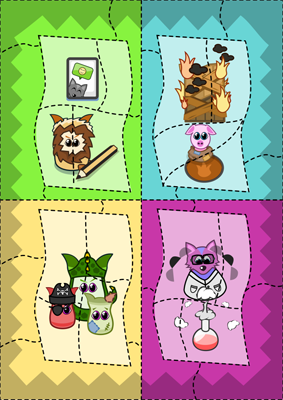
When Andrew Gregory is head of Computing at The Coleshill School, Warwickshire, and is involved with the Digital Schoolhouse (DSH) programme.
It was Warwickshire County Council that first introduced us at The Coleshill School to the Digital Schoolhouse (DSH) team. We were so impressed by what the programme had to offer, that when the council kindly agreed to fund the initiative, we applied to become a DSH school straight away. While we’re a Secondary school, a significant number of Primary school pupils have chosen to come to us specifically because they’ve enjoyed the DSH experience so much. So, from that perspective alone it’s been massively successful. However, we’ve experienced even more benefits as a school...
As Computing teachers, the programme really opened our eyes to the importance of our students understanding the subject’s concept in order to fully appreciate its principles. So many students will sit at a computer and carry out a checklist of actions to reach their desired result. What many don’t understand, however, is why they are doing these various tasks. Therefore, if there happened to be a problem (a glitch in the system, for example) at any point along this checklist, they wouldn’t be able to try alternative routes to rectify it, because they simply wouldn’t have the conceptual knowledge that would enable them to do so.
In true @DigSchoolhouse fashion, students learn #computing through dance! Taught by David, @KinetonHighSch #Programming @KES_Computing pic.twitter.com/arU5NZukNu
— Digital Schoolhouse (@DigSchoolhouse) February 15, 2018
The DSH programme is a way of simplifying and explaining concepts away from a computer, something we never would have explored before. Over a year in, not only do we use this approach with the Primary school pupils, but we also apply the same concept to our own students. We’ve put quite a lot of what we’ve learned into our schemes of work for our Key Stage 3 students; ultimately, it’s changed the way we teach Computing in the school as a whole!
A DSH session's activities depend entirely on the areas and styles upon which each school wants to focus. Workshops could focus on anything from understanding sequences in computing, to more playful computing activities (which can be embedded in workshops or delivered separately as an injection of play-based learning). Examples include:
Aims to develop the understanding of a sequence and highlight the importance of accurate instructions. Developed by DSH and Langley Grammar School, Get with the Algo-rhythm was born from the ‘Computing through Dance’ project, to use innovative computing to appeal to girls. Flow charts are developed to instruct famous dance routines, including the Hokey Cokey and Thriller!
It's a #DSHplay classic! Energising delegates after lunch with #thriller ?? @GoogleForEdu @tes Discover the full 'get with the algo-rhythm' workshop here: https://t.co/Th4B7fEMsj #DSHplay #edchat #DigitalSkills pic.twitter.com/eIavhBzO1j
— Digital Schoolhouse (@DigSchoolhouse) April 23, 2018
Cat On Yer Head is a crowd game that aims to teach key game-design principles using unplugged techniques. DSH worked in collaboration with Playniac to develop teacher guidance to help bring this exciting activity into the classroom. You can deliver it as a fun five minute starter to your lesson, or turn it into a main activity stretching over 20+ mins.
Here’s one that helps to develop strategic thinking and collaborative thinking skills within learners using jigsaw puzzles. This activity, developed in collaboration with Code Kingdoms, takes this well-loved game further by building in opportunities to develop Computational Thinking skills.

You can find more workshop ideas at www.digitalschoolhouse.org.uk/workshops.
The DSH programme benefits Secondary schools, but it is also hugely valuable for Primaries too. It’s a great way to start teaching key skills related to Computing from a young age, and helps prepare them when it comes to making the transition to Secondary school. By the time they come to us in Year 7, for example, they’re already familiar with programming and debugging system; it’s an incredible starting point for them!
WORKSHOPS ARE GO! #DSH Lead Teacher, Andrew @ColeshillSchool teaches @WillowsCE 'The Emotional Robot' @cs4fn #DSHplay pic.twitter.com/S5aGTtmAgW
— Digital Schoolhouse (@DigSchoolhouse) February 15, 2018
Primary teachers really appreciate the programme too, as obviously Computing isn’t where their skill base lies. Several teachers have told me that prior to doing the DSH workshops, the extent of their Computing knowledge would have been limited to Microsoft Word and PowerPoint. However, the programme can really help to develop their skills - some have even used it as their Computing project!
OK, so @CCCSuffolk have built a prototype "Computing Unplugged" Tic Tac Toe Neural Net, very pleased. We'll neaten it up and share with the world. It is based on what we learned @DigSchoolhouse. pic.twitter.com/O4YA8cvCpF
— Creative Computing Club CIC (@CCCSuffolk) July 17, 2018
My advice to other Secondary schools is this: Apply to become a DSH school. And to Primary schools, I say: Reach out to your nearest DSH school to schedule some workshops as soon as possible!
To find out more about the Digital Schoolhouse initiative, head over to www.digitalschoolhouse.org.uk and get involved!
Want to receive cutting-edge insights from leading educators each week? Sign up to our Community Update and be part of the action!

A community-driven platform for showcasing the latest innovations and voices in schools
Pioneer House
North Road
Ellesmere Port
CH65 1AD
United Kingdom